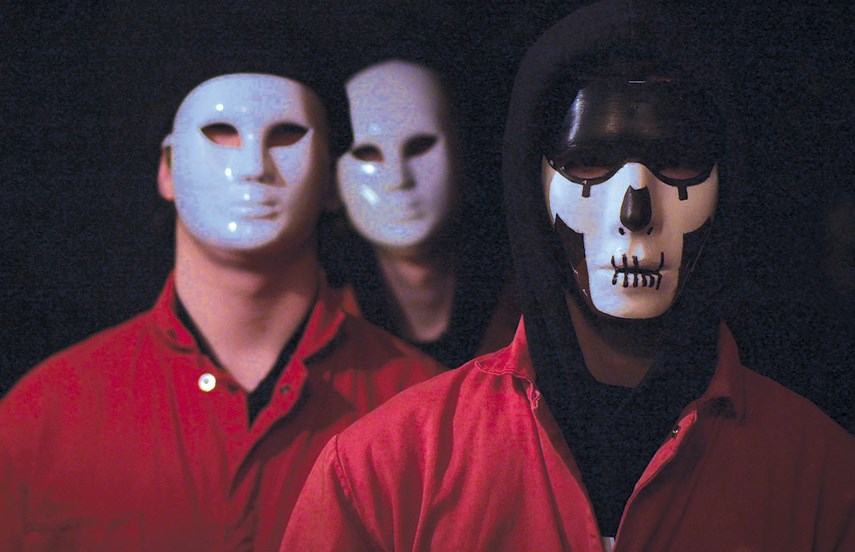A group of talented North Vancouver students tackled some tough subject matter and some even tougher COVID restrictions this year in making a feature film about a divisive annual grad event.
The game referred to as Gotcha has been around for more than a decade in North Vancouver, roping in Grade 12 students from across the district for some friendly – or some might say unfriendly – competition.
Here, in brief, is how it works. Students pay an entry fee and are assigned an individual “target” – another student who has signed up for the game. As the weeks go on, the players must physically tag their targets in a public place. The eliminated player’s target then becomes the next target of the person who tagged them.
Students cannot tag each other inside school or while they are at work. The last player in the game wins the pot, which can add up to more than $1,000.
Proponents of the game, including both parents and students alike, say that it is simple, harmless fun — a unique way to bring grads together for an engaging and entertaining senior year competition.
But critics have voiced concerns over the years about the nature of the game, which they say can involve antics ranging from embarrassing public displays to bullying and even to criminal behaviour.
In 2017, the North Vancouver School District went so far as to send out a warning about the game. The rules, as they were enforced that year, allowed players to remain in the game after being tagged if they paid extra money or immediately stripped off their clothing after being tagged. That type of behaviour could lead to charges of public nudity or worse, said school district officials, particularly if students were found to have taken or shared explicit photos of their classmates.
It’s Gotcha the game that is explored, and taken to the extreme, in Gotcha the movie, a 39-minute suspense thriller produced by the school district’s Digital Media Academy and the École Argyle Secondary drama department.
In the dark and sometimes creepy film, shot in large part at the old Argyle, before its demolition, the Gotcha game spins out of control with threats of violence echoing down the dim corridors of the school as students go on the hunt at night. There’s a bit of a Hunger Games feel to it all, and viewers are left wondering what is real and what is imagined as the heroes of the tale try to stay alive, both figuratively and literally.
Grade 12 student Emma Bigland plays Fortana, one of the film’s protagonists. Fortana teams up with another contestant named Wanda, played by Brenaugh Gatzke, to try to save themselves, and their humanity, as the Gotcha game unravels around them.
“I hope it conveys a message of anti-violence,” said Bigland about the film. “Kind of showing that it’s more important to have your friendships and the love of your friends and everyone you care about – love is more important than the violence and the fear and the trauma that we all see all the time in the media. What’s more important is the connections that we have with other people.”
Digital Media Academy teacher Chris Miller wrote the script and was heavily involved in the filmmaking process throughout, working with the students and editing the finished product. He hopes the film opens up a conversation about Gotcha and bullying as well as the prevalence of violence in the entertainment industry.
“We were trying to run that sort of fine line of pointing the finger at violence and entertainment, but also using that suspense, that thrill to try to push that message,” said Miller. “Teens have this sort of unrealistic, invincibility complex. And it really kind of clouds their judgment as they go through their last years of high school. … Not every teenager is like this, but I think there is that sort of classic teenager mindset that ‘it won’t happen to me.’ And we wanted to say – this is obviously an extreme version of – what could go wrong? Who’s the metaphorical monster in all of us?”
Aside from the message of the film, Miller also wanted to share with the world what a joy it was working with these talented young students, watching them jump into every aspect of the filmmaking process while following all health guidelines.
“I would say these are the most talented students I’ve experienced,” he said, adding that the COVID-19 restrictions were incredibly challenging for the cast and crew to navigate.
“It was the most challenging thing I’ve ever done,” he said. “And we did have to make sacrifices to the script because of COVID. But I’m really happy with what we finished with. … I really am glad that we were able to accomplish something for them that they can look back on and go, OK, that was tough, but we made a film. And we made a film that is now on the internet that anyone in the world can see.”
Bigland is certainly happy that the work they did is out there for the world to see.
“I thought that considering all the challenges, we did very good work,” said Bigland. “I’m very proud of what we’ve done.”
The film can be viewed on the Digital Media Academy’s YouTube channel. Viewers are asked to “buy” tickets to the film by making a donation to the Digital Media Academy – details are included in the description of the film on YouTube.



